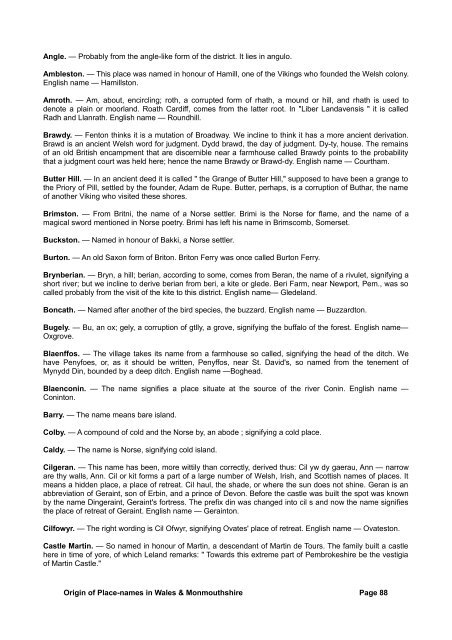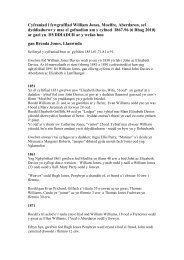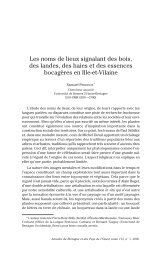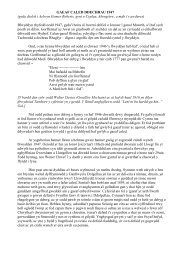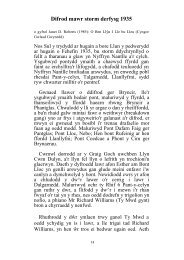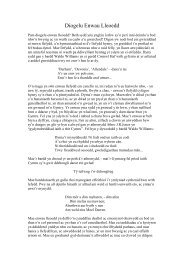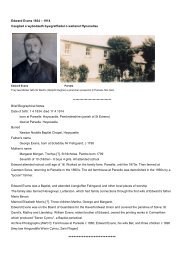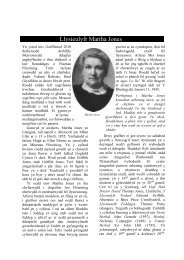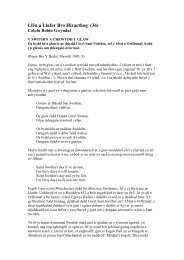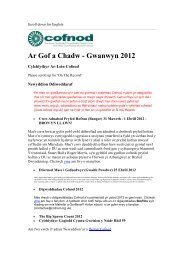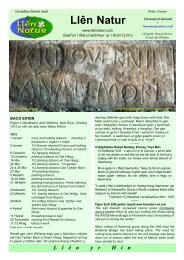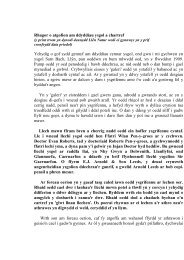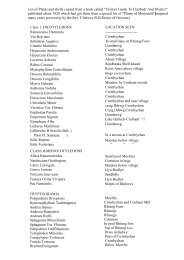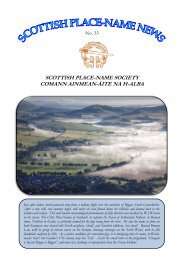Penybont Fawr. — A village <strong>in</strong> <strong>the</strong> parish <strong>of</strong> Pennant. English name — Bridgend Major.Penygelli. — The name signifies <strong>the</strong> head or term<strong>in</strong>ation <strong>of</strong> <strong>the</strong> grove. English name — Grovesend.Pont-Dolgoch. — This name signifies a bridge on <strong>the</strong> red meadow. English name — Meadow Bridge.Pontrobert. — English name — Robert's Bridge.Pentref Heilyn. — This pentref (village) derives its name from a family named Heilyn, who flourished here <strong>in</strong><strong>the</strong> time <strong>of</strong> " Llewelyn, <strong>the</strong> Last Pr<strong>in</strong>ce." Heilyn means a cup-bearer, a waiter, a butler. Heilio gw<strong>in</strong>, to servew<strong>in</strong>e. English name — Butlerton.Penegoes. — A corruption <strong>of</strong> Penegwest. The <strong>place</strong> derives its name from a supposition that a Welsh chiefnamed Egwest was beheaded near <strong>the</strong> church. English name — Feaston.Pontdolanog. — A compound probably <strong>of</strong> pont, bridge, <strong>and</strong> dolenog, hav<strong>in</strong>g curves or bows. English name— Bowbridge.Pentre Cilcwm. — Pentre, village; Cil-cwm, a sequestered <strong>place</strong> <strong>in</strong> a valley. English name — Nookham.Rhiw Saeson. — Rhiw, slope; Sarson, Saxons, English. We f<strong>in</strong>d <strong>the</strong> name Saeson <strong>in</strong>troduced <strong>in</strong>to many<strong>names</strong> <strong>in</strong> <strong>the</strong> district: Nantysaeson, Saxons' brook; Plas-rhiw-Saeson, <strong>and</strong> Rhiw Saeson. About 300 yearsago a number <strong>of</strong> Saxon soldiers were stationed <strong>in</strong> <strong>the</strong> <strong>place</strong>, which is now called Rhiw Saeson. English name— Saxonshill.Snead. — From <strong>the</strong> English snad, a piece <strong>of</strong> l<strong>and</strong> separated from a manor.Staylittle. — The ancient name was Penfforddlas, <strong>the</strong> head or end <strong>of</strong> <strong>the</strong> green way. The present name isderived from a public-house <strong>in</strong> <strong>the</strong> <strong>place</strong> bear<strong>in</strong>g <strong>the</strong> name.Tylwch. — From ty, a house ; <strong>and</strong> llwch, a lake, or <strong>in</strong>let <strong>of</strong> water. English name- -Lakeham.Tregynon. — From <strong>the</strong> dedication <strong>of</strong> <strong>the</strong> church to St. Cynan. English name — Gynonton.Tafolog. — The name implies a <strong>place</strong> abound<strong>in</strong>g <strong>in</strong> dock plants; dail tafol, dock leaves. English name —Dockham.Trefeglwys. — The name means a hamlet or a district privileged with a church. English name —Churchham.Tir-y-Mynach. — Tir, ground, territory; y, <strong>the</strong>; mynach, monk; so called from <strong>the</strong> township hav<strong>in</strong>g some timeformed a portion <strong>of</strong> <strong>the</strong> possessions <strong>of</strong> <strong>the</strong> Abbey <strong>of</strong> Strata Marcella. English name — Monkton.Welshpool. — The Welsh name is Trallwm, or Trallwng, Tra, extreme, very; llwng, a corruption <strong>of</strong> llwnga, socalled from <strong>the</strong> great depth <strong>of</strong> <strong>the</strong> lake below Powys Castle. The name signifies a greedy swallow. It hasbeen prophesied that <strong>the</strong> pool is some day to swallow up <strong>the</strong> whole <strong>of</strong> <strong>the</strong> town <strong>of</strong> Welshpool. It was calledWelshpool by <strong>the</strong> English to dist<strong>in</strong>guish it from a town <strong>in</strong> Dorsetshire called Poole. English name— Deeppool.PEMBROKESHIRE.Some Welsh scholars th<strong>in</strong>k that <strong>the</strong> Old Welsh form <strong>of</strong> <strong>the</strong> name was Peiibrog or Penbrogh, <strong>and</strong> <strong>the</strong>Lat<strong>in</strong>ized form Petnbrochia, whence probably <strong>the</strong> English Pembroke. The roots are pen, head, end; <strong>and</strong> bro ta country, or extensive tract <strong>of</strong> l<strong>and</strong>, signify<strong>in</strong>g a headl<strong>and</strong>, which is a very proper appellation, s<strong>in</strong>ce <strong>the</strong>county forms <strong>the</strong> west end <strong>of</strong> Wales. The name Dyved was once applied to <strong>the</strong> whole county, from which <strong>the</strong>Roman Dimeto was derived, but <strong>in</strong> <strong>the</strong> time <strong>of</strong> Giraldus Cambrensis, <strong>the</strong> small pen<strong>in</strong>sula <strong>of</strong> Castlemart<strong>in</strong>,ly<strong>in</strong>g between Milford Haven, on <strong>the</strong> north, <strong>and</strong> <strong>the</strong> Bristol Channel on <strong>the</strong> south, constituted <strong>the</strong> prov<strong>in</strong>ce <strong>of</strong>Pembroke. The name was also extended to <strong>the</strong> town <strong>and</strong> fortress built <strong>the</strong>re by Arnulph de Montgomery, <strong>in</strong><strong>the</strong> reign <strong>of</strong> Henry I., <strong>and</strong> ultimately it was given to <strong>the</strong> whole county.Orig<strong>in</strong> <strong>of</strong> Place-<strong>names</strong> <strong>in</strong> Wales & Monmouthshire Page 87
Angle. — Probably from <strong>the</strong> angle-like form <strong>of</strong> <strong>the</strong> district. It lies <strong>in</strong> angulo.Ambleston. — This <strong>place</strong> was named <strong>in</strong> honour <strong>of</strong> Hamill, one <strong>of</strong> <strong>the</strong> Vik<strong>in</strong>gs who founded <strong>the</strong> Welsh colony.English name — Hamillston.Amroth. — Am, about, encircl<strong>in</strong>g; roth, a corrupted form <strong>of</strong> rhath, a mound or hill, <strong>and</strong> rhath is used todenote a pla<strong>in</strong> or moorl<strong>and</strong>. Roath Cardiff, comes from <strong>the</strong> latter root. In "Liber L<strong>and</strong>avensis " it is calledRadh <strong>and</strong> Llanrath. English name — Roundhill.Brawdy. — Fenton th<strong>in</strong>ks it is a mutation <strong>of</strong> Broadway. We <strong>in</strong>cl<strong>in</strong>e to th<strong>in</strong>k it has a more ancient derivation.Brawd is an ancient Welsh word for judgment. Dydd brawd, <strong>the</strong> day <strong>of</strong> judgment. Dy-ty, house. The rema<strong>in</strong>s<strong>of</strong> an old British encampment that are discernible near a farmhouse called Brawdy po<strong>in</strong>ts to <strong>the</strong> probabilitythat a judgment court was held here; hence <strong>the</strong> name Brawdy or Brawd-dy. English name — Courtham.Butter Hill. — In an ancient deed it is called " <strong>the</strong> Grange <strong>of</strong> Butter Hill," supposed to have been a grange to<strong>the</strong> Priory <strong>of</strong> Pill, settled by <strong>the</strong> founder, Adam de Rupe. Butter, perhaps, is a corruption <strong>of</strong> Buthar, <strong>the</strong> name<strong>of</strong> ano<strong>the</strong>r Vik<strong>in</strong>g who visited <strong>the</strong>se shores.Brimston. — From Britni, <strong>the</strong> name <strong>of</strong> a Norse settler. Brimi is <strong>the</strong> Norse for flame, <strong>and</strong> <strong>the</strong> name <strong>of</strong> amagical sword mentioned <strong>in</strong> Norse poetry. Brimi has left his name <strong>in</strong> Brimscomb, Somerset.Buckston. — Named <strong>in</strong> honour <strong>of</strong> Bakki, a Norse settler.Burton. — An old Saxon form <strong>of</strong> Briton. Briton Ferry was once called Burton Ferry.Brynberian. — Bryn, a hill; berian, accord<strong>in</strong>g to some, comes from Beran, <strong>the</strong> name <strong>of</strong> a rivulet, signify<strong>in</strong>g ashort river; but we <strong>in</strong>cl<strong>in</strong>e to derive berian from beri, a kite or glede. Beri Farm, near Newport, Pem., was socalled probably from <strong>the</strong> visit <strong>of</strong> <strong>the</strong> kite to this district. English name— Gledel<strong>and</strong>.Boncath. — Named after ano<strong>the</strong>r <strong>of</strong> <strong>the</strong> bird species, <strong>the</strong> buzzard. English name — Buzzardton.Bugely. — Bu, an ox; gely, a corruption <strong>of</strong> gtlly, a grove, signify<strong>in</strong>g <strong>the</strong> buffalo <strong>of</strong> <strong>the</strong> forest. English name—Oxgrove.Blaenffos. — The village takes its name from a farmhouse so called, signify<strong>in</strong>g <strong>the</strong> head <strong>of</strong> <strong>the</strong> ditch. Wehave Penyfoes, or, as it should be written, Penyffos, near St. David's, so named from <strong>the</strong> tenement <strong>of</strong>Mynydd D<strong>in</strong>, bounded by a deep ditch. English name —Boghead.Blaencon<strong>in</strong>. — The name signifies a <strong>place</strong> situate at <strong>the</strong> source <strong>of</strong> <strong>the</strong> river Con<strong>in</strong>. English name —Con<strong>in</strong>ton.Barry. — The name means bare isl<strong>and</strong>.Colby. — A compound <strong>of</strong> cold <strong>and</strong> <strong>the</strong> Norse by, an abode ; signify<strong>in</strong>g a cold <strong>place</strong>.Caldy. — The name is Norse, signify<strong>in</strong>g cold isl<strong>and</strong>.Cilgeran. — This name has been, more wittily than correctly, derived thus: Cil yw dy gaerau, Ann — narroware thy walls, Ann. Cil or kit forms a part <strong>of</strong> a large number <strong>of</strong> Welsh, Irish, <strong>and</strong> Scottish <strong>names</strong> <strong>of</strong> <strong>place</strong>s. Itmeans a hidden <strong>place</strong>, a <strong>place</strong> <strong>of</strong> retreat. Cil haul, <strong>the</strong> shade, or where <strong>the</strong> sun does not sh<strong>in</strong>e. Geran is anabbreviation <strong>of</strong> Gera<strong>in</strong>t, son <strong>of</strong> Erb<strong>in</strong>, <strong>and</strong> a pr<strong>in</strong>ce <strong>of</strong> Devon. Before <strong>the</strong> castle was built <strong>the</strong> spot was knownby <strong>the</strong> name D<strong>in</strong>gera<strong>in</strong>t, Gera<strong>in</strong>t's fortress. The prefix d<strong>in</strong> was changed <strong>in</strong>to cil s <strong>and</strong> now <strong>the</strong> name signifies<strong>the</strong> <strong>place</strong> <strong>of</strong> retreat <strong>of</strong> Gera<strong>in</strong>t. English name — Gera<strong>in</strong>ton.Cilfowyr. — The right word<strong>in</strong>g is Cil Ofwyr, signify<strong>in</strong>g Ovates' <strong>place</strong> <strong>of</strong> retreat. English name — Ovateston.Castle Mart<strong>in</strong>. — So named <strong>in</strong> honour <strong>of</strong> Mart<strong>in</strong>, a descendant <strong>of</strong> Mart<strong>in</strong> de Tours. The family built a castlehere <strong>in</strong> time <strong>of</strong> yore, <strong>of</strong> which Lel<strong>and</strong> remarks: " Towards this extreme part <strong>of</strong> Pembrokeshire be <strong>the</strong> vestigia<strong>of</strong> Mart<strong>in</strong> Castle."Orig<strong>in</strong> <strong>of</strong> Place-<strong>names</strong> <strong>in</strong> Wales & Monmouthshire Page 88
- Page 1 and 2:
HANDBOOK OF THE ORIGIN OF PLACE-NAM
- Page 3 and 4:
§ § § § §The Author begs to st
- Page 5 and 6:
pitiful cries of the railway offici
- Page 7 and 8:
Bishop Percy says that "in England,
- Page 9 and 10:
The city of Chester is still popula
- Page 11 and 12:
There's Cumwhitton, Cumwhinton, Cum
- Page 13 and 14:
Llwyn in its primary' sense means a
- Page 15 and 16:
PLACE-NAMES IN WALES.Wales. — The
- Page 17 and 18:
Church are generally dedicated to e
- Page 19 and 20:
think he was a contemporary of St.
- Page 21 and 22:
Rhosbeirio. — Rhos, a moor, a dry
- Page 23 and 24:
of Brecknock," states that this vic
- Page 25 and 26:
Cam cnwir ef Cwmdu,Cwm gwyn yw & n
- Page 27 and 28:
Penderyn. — A corruption probably
- Page 29 and 30:
Ardudwy. — Ar, upon or above; tud
- Page 31 and 32:
to mark its pre-eminence over the o
- Page 33 and 34:
Some think that eirw is a corruptio
- Page 35 and 36:
present form — Caerfyrddin.Abergw
- Page 37 and 38:
place of refuge; hence the name. En
- Page 39 and 40: Llansawyl. — The church was dedic
- Page 41 and 42: eject. The village took its name fr
- Page 43 and 44: house, and attempted to kill an inf
- Page 45 and 46: Gwydir. — Prima facie one may tak
- Page 47 and 48: Nefyn. — The church was probably
- Page 49 and 50: DENBIGHSHIRE.Anglicized form of Din
- Page 51 and 52: Llangollen. — From Collen, a sain
- Page 53 and 54: hands into their pockets to pay a c
- Page 55 and 56: Cefn. — The name signifies a ridg
- Page 57 and 58: Maesgarmon. — Named in honour of
- Page 59 and 60: Abertridwr. — Tridwr, three water
- Page 61 and 62: it is said, was originally built by
- Page 63 and 64: Cwmllynfell. — Cwm, a narrow vale
- Page 65 and 66: Gwarycaeau. — Gwdr, the nape of t
- Page 67 and 68: means a cultivated region, a vale,
- Page 69 and 70: Penrhiwfer.- Pen, head, top; rhiw,
- Page 71 and 72: Port Talbot. — So called in 1835
- Page 73 and 74: Trealaw. — This appellation was g
- Page 75 and 76: Aberdyfi. — So called from its si
- Page 77 and 78: Llanddwywe. — From Dwywau, a desc
- Page 79 and 80: Crickhowell and some in the directi
- Page 81 and 82: Griffithstown. — This village was
- Page 83 and 84: and gwy, water. Treiddiod troth tna
- Page 85 and 86: derive Tintern from din, fortified
- Page 87 and 88: Caersws. — It appears that the Ro
- Page 89: English name — Ervylton.Llanymech
- Page 93 and 94: Gellyswick. — Another hybrid. Gel
- Page 95 and 96: that the two rivers in their flowin
- Page 97 and 98: ecame the bishop of the see, and wa
- Page 99 and 100: earth formerly stood on a summit on
- Page 101 and 102: Pilleth. — A corruption of pwll,
- Page 103 and 104: Howells, Rev. J., Mountain AshHowel
- Page 105 and 106: Williams, D., PenywernWilliams, Rev


